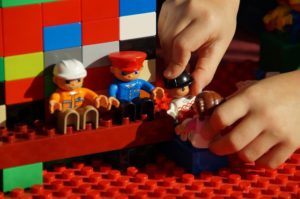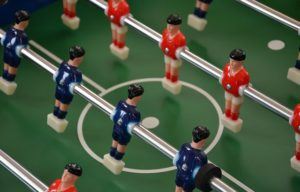 Early childhood education is something that many parents and educators feel is important. Preschools, Head start programs, learning centers, etc. provide school experiences for children before they enter kindergarten, as opposed to just providing childcare for when parents are working. There are a variety of television shows, movies, and books aimed at helping children to learn as well.
Early childhood education is something that many parents and educators feel is important. Preschools, Head start programs, learning centers, etc. provide school experiences for children before they enter kindergarten, as opposed to just providing childcare for when parents are working. There are a variety of television shows, movies, and books aimed at helping children to learn as well.
Extracurricular activities are also becoming increasingly common– it’s not hard to find a child who is learning to play a musical instrument, studying another language, or even taking extra writing or math classes to improve their skills. Whether they are aimed at infants or children who are already in elementary school, the goal of all these programs and activities is to assist children in learning.
However, you also want to allow “children to be children” and let them engage in play. Fortunately, there are plenty of cool learning games for kids that they will not only enjoy, but that will also help them learn new skills as they play.
Why Are Games Important for Learning?
Playing games, and playing in general, is not just a fun, mindless activity for children. Being able to play games is actually vital to the growth and development of children and play should be encouraged as much as possible. Playing games helps children develop not only their own creativity and imagination, but to improve their dexterity, learn new cognitive skills, build their physical strength, and develop important emotional skills.
Language learning is also aided by playing games. Parents and older children explaining the rules to a younger child allows that child to develop their listening and comprehension skills. If the child then talks about the rules themselves, they are testing out new vocabulary and learning how to explain things to other people.
In addition, playing games with their parents, siblings, and other children allows kids to develop social skills and to learn what it means to interact with other people, to share, and to effectively problem solve when arguments or disagreements arise.
Board games and other games that require more than one person allow children to interact with others and to learn how to play with people other than themselves. If a problem arises, they will learn that in order to continue to play and have a good time, the problem will need to be solved.
Through trial and error, and through playing the game many times, they will eventually learn what kinds of interactions result in a fun time and what kinds of interactions result in them having a bad time.
 Allowing a child to choose a game and to lead the game is also a good way for them to develop leadership skills and decision-making skills. Giving them the choice also lets them know that they have their own voice in the world and that their opinions and thoughts matter.
Allowing a child to choose a game and to lead the game is also a good way for them to develop leadership skills and decision-making skills. Giving them the choice also lets them know that they have their own voice in the world and that their opinions and thoughts matter.
Letting them play games that have a physical element will also help them to have active, healthy lives and allows children who may be acting out to expend some energy and let out their frustrations in a more effective way. Especially when they are very young, playing is really how children learn most of the skills that they will need later on in life to be successful, healthy, and happy.
What Kind of Games Help Children Learn?
The short answer is that playing, in general, helps children learn. If you are trying to help your child to develop certain skills or if they are falling behind in school and you’re looking for a good way to help them beyond just classroom learning and homework, certain types of games work best for assisting in the development of different skills.
“Memory” games are a type of game that can help in a variety of areas. You can use a letter memory game where pairs of uppercase and lowercase letter cards are mixed up and then placed down in order to teach literacy skills. The children playing will not only develop their memory skills, as they have to remember as they play where certain cards are in order to match them, but they will also begin to recognize “b” and “B” as the same letter and this will help them in their quest to learning to read.
Memory can also be played by pairing a word card with a picture of that word. This allows children to practice their reading skills, as they are not just matching two words that look the same. They have to know what the card with “COW” on it says in order to be able to match it to a picture of a cow. That sort of game is great for not only learning to read but for developing foreign language skills.
Puzzles are another good game to challenge children’s minds. Children’s visual and cognitive skills are tested when they have to put a puzzle together. They learn to recognize colors, shapes, and patterns as they work at matching all the pieces up.
They also develop problem-solving skills and reasoning as they work – completing a puzzle can be tough at times, especially if it is a large one, and coming up with a strategy for completing it effectively, either alone or in a group, is a great way for children to learn how to think in creative ways in order to come up with the solution to a problem.
Fine motor skills and hand-eye coordination will also be developed as the child picks up the puzzle pieces, attempts to fit them together, and arranges them.
Finding Games for Your Child
Children’s game and toys are available from many, many places. You may feel lost as to what types of games to get. A good place to find games for children of all ages and developmental stages is Fat Brain Toys. A quick look at the site will show you that they have a huge selection of toys, but don’t let that overwhelm you. Each toy Fat Brain Toys sells is designed to be fun and engaging for children while also helping with the development of different skills and allowing them to pursue various interests.
Fat Brain Toys makes it easy to find the right toy for your child. You can search by age and look through a selection of toys that are age appropriate for your child, whether they are an infant, a teenager, or any age in between. You can also search by interest. Do you have a child that loves dinosaurs? Look under the “dinosaur” interest tag and you’ll find toys and games such as 3-in-1 lego dinosaur models.
Legos and models, like puzzles, will help your child with their fine motor skills as they piece together all their different legos in order to create a t-rex, triceratops, or pterodactyl. Since they have to put the legos together in a certain way in order to achieve the desired shape, they will also use their problem-solving skills and hone in on those reading and comprehension skills while they look through picture and instructions to assist them. 3-in-1 lego models also have the added bonus of giving children the choice between different kinds of dinosaurs, so they’ll stay engaged longer than if there was only one way to put the legos together.
Outside of age and interest, you can also search by category. Want to get your child your favorite game or toy from when you were young? Search in “classic and retro toys”. Does your child love games that involve music? There’s a category for that as well. If your child has special needs, you can search for toys for them easily.
You’ll find lists of toys for children with ADD/ADHD, autism, down syndrome, speech/language delay, vision impairment, and much more. These toys aren’t just randomly selected, either. Educators, therapists, parents, and others with experience in working with children with special needs all helped in creating the lists of toys that you’ll find on Fat Brain Toys.
Education + Fun!
Education is important. Everyone (parents, guardians, educators, etc.) wants children to develop the skills they need in order to live the best possible lives that they can. Learning doesn’t have to be a chore, though. If your child just isn’t learning to read by staring at books all day or if they absolutely hate math, don’t worry!
There are games out there that they will enjoy while also learning those necessary skills. Education isn’t just about problem sets and homework assignments. By playing games, children learn and develop in a more natural, free-flowing way. Games also teach children skills that they just can’t be taught in a single class.
There is no “problem solving” subject in school. There’s no class that teaches you how to share and work with other people. You can’t learn hand-eye coordination by listening to someone explain what it is. Children need to play games and have fun with their family and friends in order to learn all of these skills. Let them play some cool learning game for kids and they’ll learn what they need along the way.